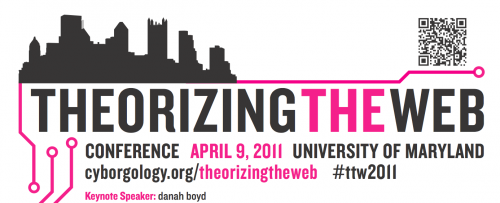In about ten days, I’m heading to a conference in College Park, Maryland. It’s being thrown by the editors of cyborgology, an exceptional resource site for all things social & technological, for hybrids and cyborgs of all stripes.
The conference is titled Theorizing the Web. The panel I’m on is titled Cyborgology: see the abstracts? Cool stuff. The program? Augmented realities, counter-discourses, digital agency. I don’t get to have these conversations very often. And I’m rooming with an old blog friend whom I’ve never actually gotten to meet in person. So all in all, this will be good.
(It’s also pay-as-you-can. You should come.)
But there’s one hitch. My paper’s not quite done.
I’m doing a paper on theory work that will be the body of my dissertation. Some of the premises I’ve worked out, largely. But I’m still at the pre-proposal stage of my doctorate, so I’m writing this stuff for the first time. Which is good. And bad.
Writing, for me, is like a binge on the “Eat Me” cakes in Alice in Wonderland: it changes everything. I start somewhere and then I writhe in circles and dig up research and cringe horribly at my own naivete and spit stuff out anyway and then push and pull at words in a recursive fashion that sloths would call tedious. Stuff gets out there, eventually. But I learn more than I know how to say, how to cram together in a coherent trail. And I wish sometimes that it would just hurry up and get easier, this theory writing, this massive learning curve I’ve set ahead of myself like a ski jump.
I assume it does. I assume someday I’ll at least understand most of the grounding principals I’m working with, in this strange hybrid field of the social and the technological and the educational. But right now, every idea I eke out is a croquet game detouring into the bushes.
Someday, all this will not be novel. For me, for now, a lot of it still is. It’s slow-going, and I need to giddyup. But it is still the most interesting work I’ve ever done. I hope I can pull it together enough in the next ten days to do it justice.
***
Here is my abstract: the Coles notes. Input & critique welcome. Hurry.
The Branded Self: Cyborg Subjectivity in Social Media
My work takes up the question of who we are when we’re online. Participatory, reputation-focused online platforms such as Twitter, Facebook, and blogs allow people to perform their learning, their sociality and interests, their narrative histories and their minutiae in newly public, connected ways. The premise of my research is that these ongoing interactive performances open up new conceptions of self and subjectivity, and create new horizons and challenges within the field of education.
Donna Haraway called her original A Manifesto for Cyborgs (1991) an “ironic political myth”. In the late 20th century, she named the cyborg as our ontology, a representation of our societal and cultural politics. In reviving her cyborg for the era of social media, I explore its mythic potential for the relational and participatory knowledge-making sphere of social media, where new stories of self are told and reflected. With a deep bow to Haraway, my exploration of the branded cyborg subject aims to be an ironic educational myth for the 21st century.
I think of all of us using social media as branded selves, cyborgs whose online and offline lives blur. We are cyborgs because we are hybrids; because our “real lives” play out in part in cyberspace. We are branded because the cyberspace environment operates by branding – and socializing – all who enter: social, financial, and cultural capital are as central to the circulation of power and knowledge online today as the technologies and the human networks which form its infrastructure. The identities through which we connect with others and engage in the shared creation/consumption cycle that marks the social media economy are branded identities, even if we never monetize our brands.
Informal polls of cyborg subjects who live large portions of their lives online suggest that they generally consider their digital identities simply as extensions of themselves rather than as anything separate and distinct. I utilize Judith Butler’s notion of performativity to examine the constitution of subjectivities both online and off: those of us who become cyborg are always already subjects, yet the life that our stories and selves take on in cyberspace impacts our everyday lives in turn. Thus there is no dualistic divide between digital self and embodied self.
Nonetheless, the digital performance of identity warrants specific focus. The conventions and operations surrounding online interactions are not the same as in so-called “real life,” even when cyborg subjects try to conduct ourselves similarly across environments. The speed of connections, the different structures governing hierarchical relations, and the different conventions and etiquettes of online and offline life alter the subject positions that the environments create and privilege. The discursive field of social media – which my work posits as the site or stage on which the cyborg self performs and circulates – deviates from that of the broader culture. Some things are more speakable online than in real life, and the ways in which people interact and build knowledge within networks differs. My work treats our digital identities as offshoots of previously existing subjectivities, learning and engaging in augmented digital environments but always in a recursive relationship with our embodied selves.
